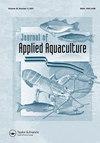日粮蛋白质水平对中盐度内陆地下盐水中饲养的 GIFT 幼鱼生长和代谢的影响
IF 0.8
Q3 FISHERIES
引用次数: 0
摘要
摘要 进行了一项为期 60 天的喂养试验,研究不同水平的日粮蛋白质对在 15 克/升的内陆地下盐水(IGSW)中饲养的 GIFT 罗非鱼幼鱼的生长指标、血液生化状况和代谢反应的影响。按照完全随机设计(CRD),将 315 尾适应鱼(平均体重为 4.01 ± 0.01 克,放养密度为 15 尾/缸)随机分配到七个实验组--20% (CP20)、25% (CP25)、30% (CP30)、35% (CP35)、40% (CP40)、45% (CP45) 和 50% (CP50),每组三份。增重(WG)、代谢生长率(MGR)、饲料效率比(FER)和蛋白质生长率(PGR)呈现较高的二次方关系(R2 分别为 0.93、0.96、0.92 和 0.90),CP40 组的数值最高(P < 0.05)。蛋白质效率比(PER)随着日粮蛋白质水平的增加而明显下降(P < 0.05)。与蛋白质水平较低的同类相比,膳食蛋白质水平较高的组的肌肉和肝脏 AST(R2 = 0.71,0.75)和 ALT(R2 = 0.77,0.69)活性、血红蛋白(Hb)含量(R2 = 0.87)、血细胞比容(Hct)值(R2 = 0.93)和红细胞(RBC)计数(R2 = 0.88)的二次方关系更高(P < 0.05)。CP20 和 CP50 组的肌肉 LDH 和 MDH 活性分别最高(P < 0.05),且有很强的线性和二次关系。CP40 组的血清葡萄糖水平最低(P < 0.05)。二阶多项式回归分析表明,在 15 克/升的 IGSW 中,41.85%的日粮蛋白质对 GIFT 罗非鱼幼鱼的生长指标、营养利用率和代谢状况都是最佳的。本文章由计算机程序翻译,如有差异,请以英文原文为准。
Effect of dietary protein level on growth and metabolism of GIFT juveniles reared in inland ground saline water of medium salinity
ABSTRACT A 60-day feeding trial was conducted to study the effect of varying levels of dietary protein on growth metrics, hemato-biochemical status, and metabolic responses of GIFT tilapia juveniles reared in inland ground saline water (IGSW) of 15 g/l. A random distribution of 315 acclimated fish (avg. wt. 4.01 ± 0.01 g, stocking density 15 fish/tank) was done in seven experimental groups—20% (CP20), 25% (CP25), 30% (CP30), 35% (CP35), 40% (CP40), 45% (CP45), and 50% (CP50)—in triplicates following a completely randomized design (CRD). Weight gain (WG), metabolic growth rate (MGR), feed efficiency ratio (FER), and protein growth rate (PGR) showed higher quadratic relations (R2 = 0.93, 0.96, 0.92, 0.90 respectively) with highest (P < 0.05) values in the CP40 group. Protein efficiency ratio (PER) significantly (P < 0.05) decreased with increase in dietary protein levels. Higher (P < 0.05) quadratic relations of muscle and hepatic AST (R2 = 0.71, 0.75) and ALT (R2 = 0.77, 0.69) activities, hemoglobin (Hb) content (R2 = 0.87), hematocrit (Hct), value (R2 = 0.93), and red blood cell (RBC) count (R2 = 0.88) were found in groups fed higher levels of dietary protein than their lower protein-fed counterparts. Muscle LDH and MDH activities were the highest (P < 0.05) in CP20 and CP50 group respectively with strong linear and quadratic relationships. The lowest (P < 0.05) serum glucose level was found in the CP40 group. Second-order polynomial regression analysis indicated that 41.85% dietary protein is optimum with respect to growth metrics, nutrient utilization, and metabolic status of GIFT tilapia juveniles in IGSW of 15 g/l.
求助全文
通过发布文献求助,成功后即可免费获取论文全文。
去求助
来源期刊

Journal of Applied Aquaculture
Environmental Science-Ecology
CiteScore
3.20
自引率
0.00%
发文量
38
期刊介绍:
The Journal of Applied Aquaculture is a platform for the sharing of practical information needed by researchers to meet the needs of investors, farm managers, extension agents and policy makers working to adapt aquaculture theory to achieve economic and food security objectives in the real world. The journal emphasizes multi-disciplinary research and case studies that propose financially and logistically viable solutions to observable problems.
 求助内容:
求助内容: 应助结果提醒方式:
应助结果提醒方式:


